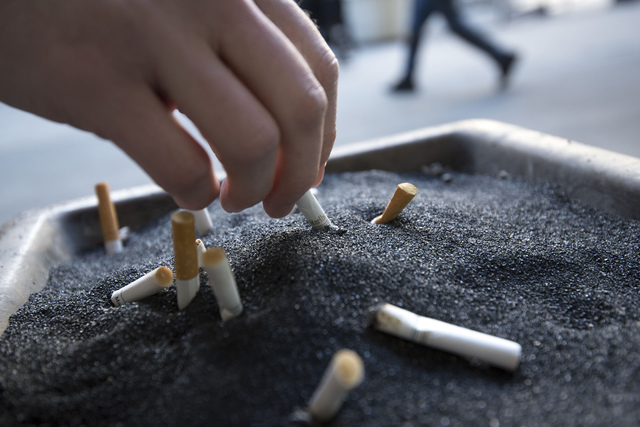AUSTIN, Texas — This could be the year Texas raises the smoking age to 21. ADVERTISING AUSTIN, Texas — This could be the year Texas raises the smoking age to 21. For a decade, the concept has been a pipe
AUSTIN, Texas — This could be the year Texas raises the smoking age to 21.
For a decade, the concept has been a pipe dream of Democrats and doctors bent on finding ways to keep Texans, especially kids, from picking up the habit. But this year it has backing from some powerful Republicans whose support could mean Texas will become just the third state to hike its smoking age above 19.
“We can move this bill forward,” said Rep. John Zerwas, a Richmond Republican and physician who will champion the effort in the House. He will be joined by Rep. Donna Howard, D-Austin, and Sens. Joan Huffman, R-Houston, and Carlos Uresti, D-San Antonio, who will each file a bill.
Raising the minimum legal age to buy products like cigarettes and chewing tobacco has been the goal of Texas Democrats for at least a decade. But with Republicans decrying the effort as an infringement on personal liberty that could cost the state millions of dollars in lost tax revenue, the wish went up in smoke every time it was proposed.
Five times, Uresti has tried to convince fellow lawmakers that hiking the smoking age will save lives and reduce the state’s health care costs in the long term. He started small in 2007, proposing Texas raise the tobacco purchase age to 19. He failed.
In 2009, he got his bill through the Senate, but it died in the House. In 2011, 2013 and 2015, the proposal never made it off the starting block. This year, with bipartisan support, Uresti said he’s excited about possibly realizing this longtime goal.
“We have as good a chance as we’ve ever had,” said Uresti. “I’m just glad. I welcome all the support we can get.”
Raising the smoking age will save lives and money, according to Dr. Ernest Hawk, vice president of cancer prevention at M.D. Anderson Cancer Center in Houston.
“This is a high priority for us as an institution because it’s exactly what we’re here to do,” Hawk said. “This directly aligns with our mission of eliminating cancer in Texas and the world because this is one of the best ways to do that.”
Tobacco use in Texas and nationally is down, thanks in large part to anti-smoking campaigns and increased cigarette taxes, Hawk said. And smoking rates are lower in Texas than the country’s average, with just 15.9 percent of adults admitting to the habit in 2013.
But raising the tobacco purchase age to 21 could result in an additional 12 percent decrease in tobacco use among adults, according to a 2015 report from the National Academy of Medicine, and a “33 percent reduction in the use of all tobacco products by 18- to 20-year-old Texans,” according to a 2013 analysis by the Texas comptroller’s office.
That’s because people who don’t start smoking when they’re teenagers are less likely to pick up the habit when they get older. Raising the smoking age, Hawk added, means there’s “more distance” between the population most curious about cigarettes — teens — and those who could legally buy the product for them.
The state will also save money in the long run because it won’t have to care for as many people beset by tobacco-related illnesses, like cancer and emphysema, and fewer babies with tobacco-linked ailments would be born if the smoking rate decreases. The savings could be as much as $406 million over five years, according to an analysis from the Department of State Health Services.
Texas could save nearly $5.6 billion in health care costs over 25 years, the department estimates, and preterm births would reduce by 11.6 percent over 20 years.
“Reductions in tobacco-related illnesses will take decades to realize,” the state analysis reads. “But there would be immediate reduction in adverse physiological effects and poor infant health outcomes.”
While the long-term benefits are clear, the four lawmakers who want to raise the smoking age are likely to have to fight against those who argue that doing so will cost Texas in the short term.
Every smoker knows the state taxes every pack of cigarette, tin of dip and can of snuff. Raising the minimum age to buy these products by three years would mean a loss of nearly $100 million in taxes over five years, according to a 2013 analysis of one of Uresti’s past bills. Some Republicans might also have a problem with Texas throwing its lot in with the likes of Hawaii and California, the only other states that have raised the smoking age above 19.



